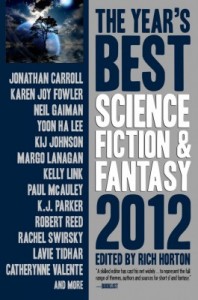 An interview by Gina Guadagnino
An interview by Gina Guadagnino
“A Small Price to Pay for Birdsong” by K.J. Parker will be appearing in Prime’s forthcoming Year’s Best Science Fiction and Fantasy: 2012 edited by Rich Horton.
Do you have a background in music? If so, what sort? Did you write, sing, compose, play an instrument, or some/all of the above?
It’s one of my greatest regrets that I can’t play a musical instrument (unless you include the anvil) I’ve tried to learn, many times, but I just can’t do it. Same goes for composing; I have absolutely no idea how someone can simply create a piece of music. Where does it come from? How can so many completely different things be made up out of just eight notes? It must be the nearest thing to magic in a Newtonian/Einsteinian universe.
Obviously there’s a motif of ‘the caged bird’ in “A Small Price to Pay for Birdsong.” Which came first, the idea of the caged bird, or the characters and the story?
As always with me, the characters came first, and the characters are the walking wounded I intercept as they limp away from the battle between right and wrong. I’m very much a one-trick pony. Everything I write deals with the debatable land on the border of good and evil. In ‘Blue & Gold’ I had a whole lot of fun with the idea of someone who was (a) a leading philosopher and scientist and (b) a conman and habitual liar always one jump ahead of the law; all I had to do was turn him loose and follow him around for a while. This time, I took a similar character and locked him in a confined space with his exact opposite. (If there’s a Society for the Ethical Treatment of Characters somewhere, I imagine I’m quite high up on their hit list). To that extent, the idea of putting caged birds on a window ledge so they’ll overheat, suffer and sing is something of an in-joke, since that’s what I like to do with the characters I write about.
The narrator’s artistic inspiration and opinion of his own work is (sort of) redeemed or rekindled by his student Subtilius. This offers a nice counterpoint to the old chestnut/frustrating stereotype of “those who can’t, teach.” Was that deliberate? Do you think there is something inherently inspiring or redemptive about teaching?
I’ve done a small amount of teaching (well, sports coaching; almost the same thing) and enjoyed the buzz that comes from helping someone else do what I love doing; but the relationship between master and pupil in the story is a bit more destructive and parasitical than that. I think the only reason the narrator teaches is because he gets paid for it; in his mind there’s a straight-line correlation between art and money which informs and (implicitly) undermines all his artistic activity, not because he’s greedy for money (far from it; when he comes into money, he carries on living a frugal, pretty miserable lifestyle) but because he spends his entire life terrified of poverty; that’s what clips his wings, so to speak. If he’s redeemed at all (and I tend to think he is, though that’s entirely for the reader to decide), it’s by undeserved prosperity, which comes from stealing the work of a genius and passing it off as his own. I see him as a victim of an unfair world who, by perpetrating a gross unfairness of his own, achieves a kind of justice, which in turn he hands out to his polar opposite, Subtilius—two wrongs making about 40% of a right. I feel that’s rather more interesting, in terms of both morality and character development, than the conventional moral boxing-match you mostly seem to get in fiction.